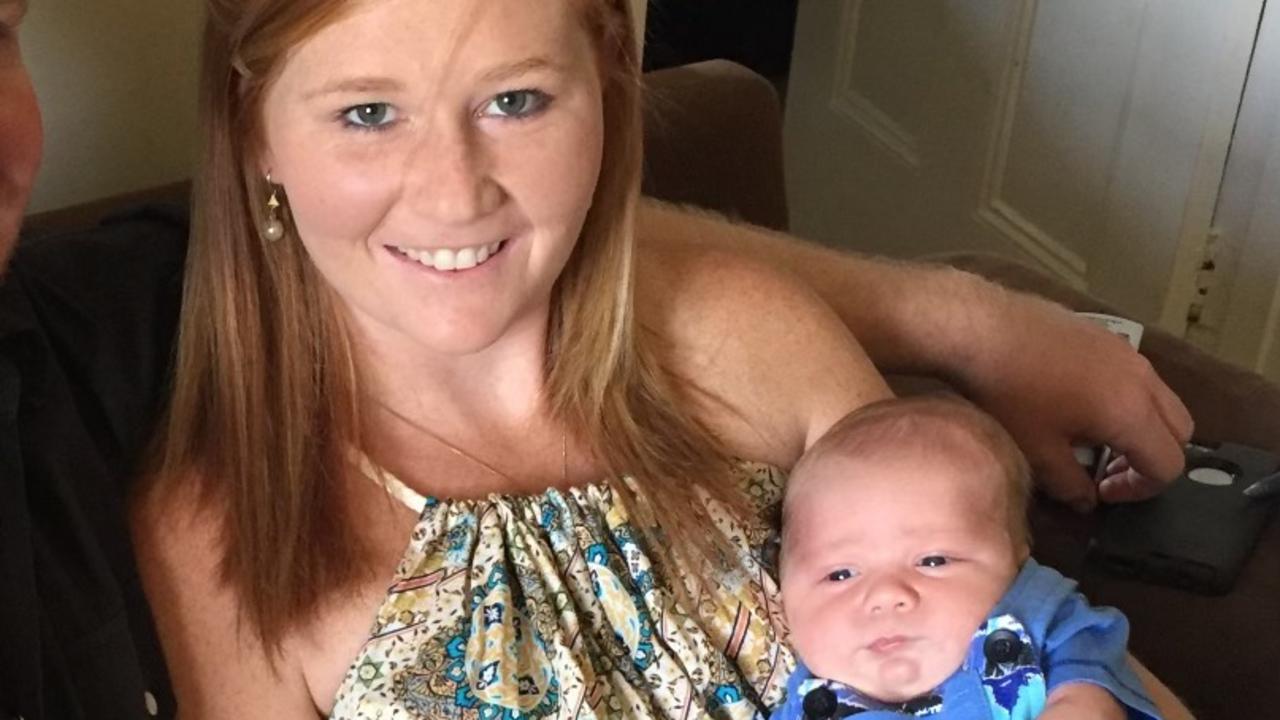$10 reason 4yo boy can’t have ‘normal life’
For Lykera Parker seeing another child walk can trigger a pang of sadness.
Because she knows that while her son Kalarny is as bubbly and outgoing as any four-year-old, he will never be able to walk unassisted.
What makes it even harder for the 30-year-old mum is knowing that a $10 medical procedure is the difference between her son’s condition now and the life he could have had.
“He could have had a chance at a normal life if it was detected early,” Ms Parker told news.com.au.
At 11 weeks old Kalarny was diagnosed with spinal muscular atrophy (SMA), with doctors telling Ms Parker and her husband Aaron Parker to go home and prepare for their son’s funeral.
Today the 30-year-old mum, from Mudgee NSW, is calling for a test that could have detected Kalarny’s SMA just hours after she gave birth to be made available to all babies born across Australia.
He was a ‘very placid’ baby
As first-time parents Ms Parker and Mr Parker thought they had lucked out with a “very placid” baby when Kalarny was born in 2017.
“We just put it down to the fact that Aaron and I are very chill, we just thought he was pretty chill,” Ms Parker said.
But the couple soon became concerned by the fact Kalarny would always go straight to sleep after being fed, seemed “floppy” and couldn’t lift his head during tummy time.
At his six-week check-up Kalarny’s GP expressed concern that the newborn was having trouble breathing and ordered more tests to investigate.
When Kalarny was just eight weeks old he was rushed from a paediatrician appointment to hospital after showing signs of heart failure.
A week later Kalarny underwent lifesaving heart surgery at The Children’s Hospital at Westmead.
Then, two weeks following the surgery, specialists diagnosed Kalarny with SMA.
SMA is an inherited, genetic condition which affects the nerves in the spinal cords which control all of the muscle movement of the body, including the muscles of head control, arm and leg movement.
When SMA isn’t detected shortly after birth the condition can cause irreversible damage to motor neurons and even death.
“(The doctor) said, ‘He’s got spinal muscular atrophy’, and we were like, ‘What does that mean?’, because we’ve never heard of it before,” Ms Parker recalled.
“He said, ‘It means that your child will not live.’ Of course we were devastated and he pretty much told us to go home and plan a funeral, as there was nothing they could do.”
Fortunately the Parkers were able to access medical treatment that had not yet been approved in Australia on compassionate grounds which has saved Kalarny’s life.
As part of his treatment for SMA Kalarny has undergone multiple surgeries, gets lumbar punctures every four months as well as a different kind of therapy every day.
‘A normal child that’s trapped inside a baby’s body’
Kalarny relies on a wheelchair or walking frame to move around, however tires quickly when using the frame to move.
“You’ve pretty much got a normal child that’s trapped inside a baby’s body,” Ms Parker said.
While Ms Parker feels incredibly lucky her son is still alive, it’s also difficult to come to terms with the fact that had a test for SMA been done shortly after Kalarny was born in 2017, things would be different.
In Australia, parents of every newborn are offered a routine heel-prick blood test to check babies for genetic illnesses such as cystic fibrosis.
Screening for SMA has been included in the test since 2018 as part of a trial in NSW and the ACT.
The SMA test costs around $10.
In Australia newborn tests currently only screen for 25 conditions compared to the US state of California, which tests for 80.
“We’re happy for the parents that have access to it, it brings you to tears seeing how well they are doing and how much of normal life they (have),” she said.
“But as a parent your heart breaks when you see another child taking a step because they had intervention before they got too weak.”
As part of SMA Awareness Month, SMA Australia is calling for the newborn heel-prick test to include SMA detection for all Australian newborns.
“$10 is nothing in the scheme of a child’s life,” Ms Parker said.
“Every child deserves to lead a happy and fulfilling life without having to be trapped essentially in a baby’s body, not being able to breathe, not being able to eat. It just takes everything away from them.”
For all the latest lifestyle News Click Here

